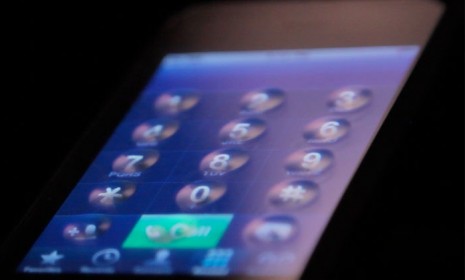The touchscreen tablet with a pop-up keyboard
A new company tries to give tablet users the best of both worlds by combining the ease of swipes and gestures with physical keys that "magically" appear

A free daily email with the biggest news stories of the day – and the best features from TheWeek.com
You are now subscribed
Your newsletter sign-up was successful
Typing on a touchscreen tablet or phone can be frustrating for those who miss the sensation of pressing an actual key. A new prototype from Tactus Technology, a hardware company based in Fremont, Calif., offers a novel solution to the problem: Bubble-like keys that "rise" out of the flat touchscreen, then disappear when you're done typing. "You could text on a tactile keyboard, and then go right back to swiping through your Twitter feed," says Rebecca J. Rosen at The Atlantic. Here's how it works:
How do the keys appear?
The technology uses something called a Tactile Layer, which "replaces the glass or plastic that normally sits on the touchscreen sensor and display," says Peter Murray at Singularity Hub. The layer is only 0.75mm to 1mm thick and sits on top of another layer containing microfluid; the tablet uses pressure to "almost magically" inflate the buttons with microfluid and make them three-dimensional. For now the physical keys are only available in predetermined patterns — like a QWERTY keyboard — but the company eventually hopes to make different configurations available.
The Week
Escape your echo chamber. Get the facts behind the news, plus analysis from multiple perspectives.

Sign up for The Week's Free Newsletters
From our morning news briefing to a weekly Good News Newsletter, get the best of The Week delivered directly to your inbox.
From our morning news briefing to a weekly Good News Newsletter, get the best of The Week delivered directly to your inbox.
Why create bubble-like keys?
With the advent of touchscreen-based iPhones and Androids, CEO Craig Ciesla realized he missed the sensation of typing on a BlackBerry. (Watch a demonstration below.) In a demo using a specially outfitted Android tablet, the user had to exert "a fair amount of pressure" to push the wet-look keys all the way down, says Andrew Munchbach at Engadget, so it's not quite BlackBerry-like. The trade-off is you get the "physical input experience without sacrificing screen real estate."
Does the technology affect the overall look of devices?
The Tactile Layer makes devices a tiny bit thicker, and it adds a "finish or sheen" that slightly alters the display — something that takes getting used to, says Munchbach.
A free daily email with the biggest news stories of the day – and the best features from TheWeek.com
When will the technology be available?
The company currently has "no hardware partnerships it's willing to speak on the record about," says Nathan Ingraham at The Verge. But Tactus insists that its physical keys will begin appearing on all kinds of touchscreen products — from handheld games to appliances to car interfaces — beginning in 2013.
Take a look:
Sources: The Atlantic, Engadget, Singularity Hub, The Verge